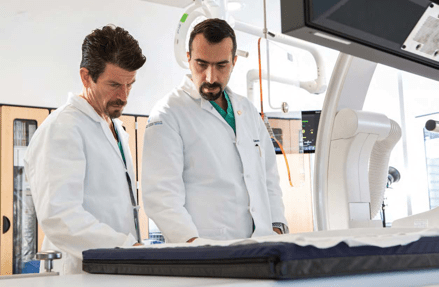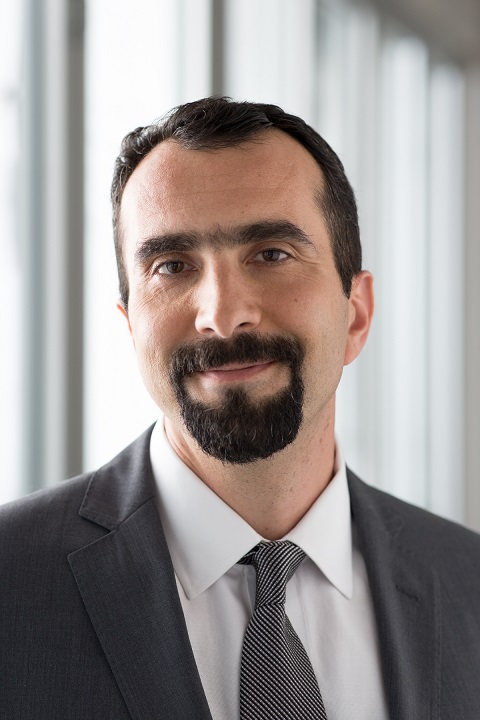“I did part of my nursing training there in 2013. I knew RWJUH Hamilton was one of the best hospitals in New Jersey.”

Marcia of Burlington didn’t know what to make of the pain she felt in her neck.
It started mild but gradually got worse. Was it an injury from lifting? As a 61-year-old neurology nurse working in New York City, Marcia often needed to assist patients on the job. Doctors she consulted offered different opinions. One thought she had a pinched nerve, another arthritis.
“Then one day around the holidays in 2021, the pain got really bad,” Marcia says. “I thought something was definitely wrong, and it was more than what anybody had been saying.”
She decided to go to a hospital for a comprehensive workup. Familiar with health care throughout the region, she opted to seek treatment at Robert Wood Johnson University Hospital (RWJUH) Hamilton. “I did part of my nursing training there in 2013,” Marcia says. “I knew RWJUH Hamilton was one of the best hospitals in New Jersey.”
A Difficult Diagnosis
Team members at the Center for Neurosciences and The Orthopedic and Spine Institute at RWJUH Hamilton quickly diagnosed Marcia’s true problem.
The news wasn’t good: Marcia had a cancerous tumor toward the base of her neck’s cervical spine, at vertebrae C5 and C6.
“It was traumatic,” Marcia says. She had a history of breast cancer, including a double mastectomy to remove her breasts in 2014. “I had thought that was the end of cancer,” she says. “I knew it was possible for cancer to come back, but I didn’t expect it.”

She consulted Zakaria Hakma, MD, Director of Neurosciences and Chief of Neurosurgery at RWJUH Hamilton, and a member of Global Neurosciences Institute, about what to do next. “We went over details of my extensive workup,” Marcia says. The two brought Marcia’s sister into the conversation by phone for another perspective. “We decided I definitely had to do surgery,” Marcia says. “I felt safe with Dr. Hakma.”
“It speaks volumes that she’s a neurology nurse and, when diagnosed with a serious problem, had informed confidence in the expertise and capabilities available at RWJUH Hamilton,” Dr. Hakma says. “She trusted our neuroscience program with a complex surgical procedure and didn’t feel the need to travel anywhere else.”
Removing Cancer
In January, Dr. Hakma performed what Marcia calls “a very big surgery.” It involved both a corpectomy, in which the diseased vertebrae were removed, and spinal fusion, in which remaining vertebrae were stabilized and joined with help from a cage-like implant.
The surgery was successful, and after six days in the hospital, Marcia went home wearing a neck brace that facilitated healing. Outpatient physical therapy in the weeks that followed helped her recover and improve functions such as walking. She continued being treated for cancer with both radiation and ongoing chemotherapy.
Marcia says her care was everything she had hoped for. “My incisions healed well, with no signs of drainage or infection,” she says with trained perspective. “I’m walking, and my gait is steady. I felt my care was great.”
Comprehensive, Convenient Care for Neurological Issues
“Neuroscience services at Robert Wood Johnson University Hospital (RWJUH) Hamilton have the clinical expertise and tools to provide advanced care close to home,” says Zakaria Hakma, MD, Director of Neurosciences and Chief of Neurosurgery. Enhancing the hospital’s neurosciences care are:
- Sophisticated technology: Tools include GPS-like intraoperative navigation that maps the brain and helps guide procedures more precisely; single-plane angiography that helps image arteries during procedures to restore blood flow to the brain; a state-of-the-art microscope that allows surgeons to perform more delicate operations; and a wide range of other advanced imaging technologies.
- Highly specialized doctors: “Our comprehensive services cover virtually every neurologic specialty,” Dr. Hakma says. These include general, spinal and cranial surgery along with subspecialties like functional neurosurgery to treat disorders such as Parkinson’s disease; neuropsychology to care for cognitive problems such as dementia or deficits after stroke; cognitive neurology treating Alzheimer’s disease and dementia; and neuromuscular neurology.
- A diverse, expert team: “In addition to a deep roster of doctors, we have specialized staff such as physician assistants trained in neuroscience along with neuropharmacists who are tremendously helpful for complex patients who can sometimes take more than a dozen medications,” Dr. Hakma says.
- Advanced rehabilitation: Rehab services are integral to comprehensive neurosciences care provided in a single location at Pennington. “This is the greatest concentration of neurology services in the area,” Dr. Hakma says. “Having services in one place is more convenient for patients, and they feel at ease when doctors can walk over and personally introduce them to physical and occupational therapists.”
- Collaborative care: “We don’t work in silos but work hand in hand across subspecialties,” Dr. Hakma says. “It’s rare to see that kind of collaboration, but it improves care and makes things easier for patients.”
“We have a truly patient-centered approach to groundbreaking therapies and new surgical techniques,” says Richard Freeman, President and Chief Executive Officer, RWJUH Hamilton. “Our innovative team of neurosurgeons, specialty neurologists and neurologic researchers, coupled with specially trained nurses, therapists and other allied health professionals, work together to provide a world-class, integrative, multidisciplinary approach to complete patient care.”
To learn more about the Center for Neurosciences at RWJUH Hamilton or to schedule an appointment, call 888-724-7123.
RWJBarnabas Health and Robert Wood Johnson University Hospital Hamilton, in partnership with Rutgers Cancer Institute of New Jersey—the state’s only NCI-Designated Comprehensive Cancer Center—provide close-to-home access to the most advanced treatment options. Call 844-CANCERNJ or visit our Cancer page.